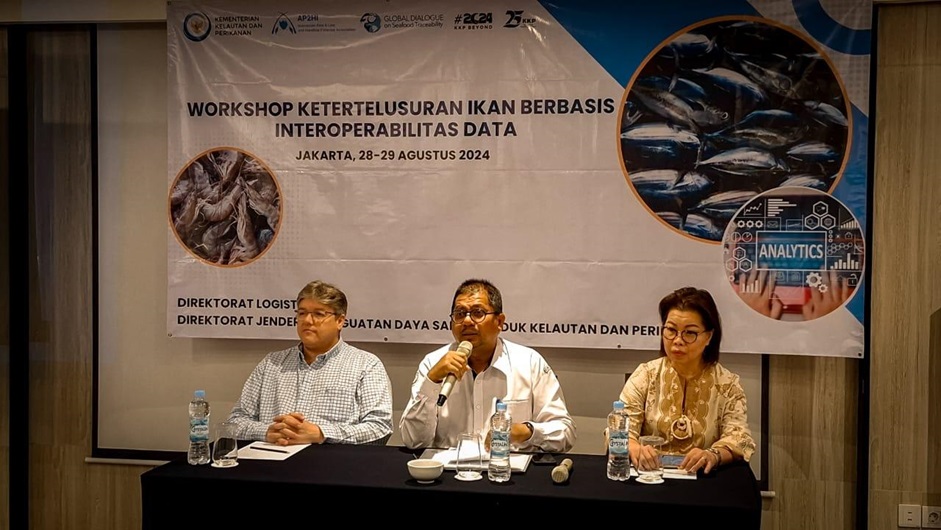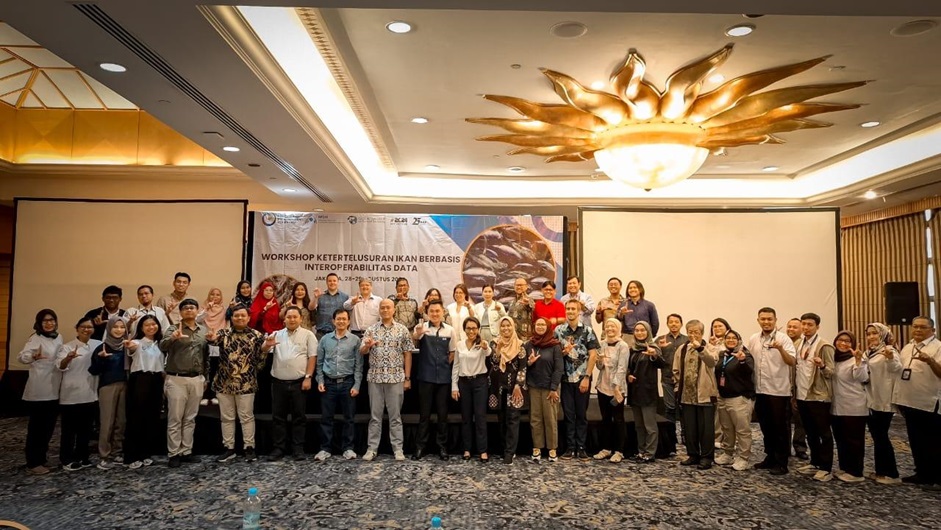Indonesia has taken a groundbreaking step by upgrading its national seafood traceability system, Stelina, to be compatible with the Global Dialogue on Seafood Traceability (GDST) Standard.
This makes Indonesia, one of the largest global seafood exporters, the first country to align a government-led system with international standards that ensure its seafood products meet the highest global traceability and sustainability requirements.
Indonesia’s Stelina traceability system tracks seafood throughout its journey—from fishing boats to the final market—by capturing essential data about its origin, handling, and legality. This interoperable traceability—the ability for different systems to communicate and exchange data seamlessly— is crucial for combating illegal fishing, protecting marine ecosystems, and meeting the demands of global markets.
The Food and Agriculture Organization (FAO), has emphasized the importance of standardized traceability systems in ensuring sustainable fisheries and fair trade in its State of World Fisheries and Aquaculture report. By upgrading Stelina to align with the GDST Standard, Indonesia can now enable seamless data sharing between seafood businesses and government, ensuring seafood products are both sustainable and compliant with international trade standards around sustainability and safety. This provides greater reassurance to markets in the United States and Europe, where policy requirements and consumer demand are driving the need for full product traceability. The U.S. especially is a top importer, purchasing $889.39 million of Indonesian seafood products in the first half of 2024 alone, accounting for 38% of Indonesia’s total seafood exports.
This achievement reflects Indonesia’s global leadership in adopting cutting-edge technology to support responsible fisheries management, working alongside influential stakeholders in the country’s seafood industry like the Indonesian Pole & Line and Handline Fisheries Association (AP2HI). It also highlights the growing recognition of the GDST Standard as a bridge between industry practices and government policies.
Berny A. Subki Director of Logistics at the Indonesian Ministry of Marine Affairs and Fisheries (MMAF) said:
“As a country with one of the largest and most diverse fisheries sectors, Indonesia is taking a leading role in adopting and implementing the GDST standards. This initiative demonstrates Indonesia’s commitment to global seafood traceability, sustainability, and combating IUU (Illegal, Unreported, and Unregulated) fishing practices.
Through strong collaboration between government, industry stakeholders, and associations like AP2HI, Indonesia has developed a structured roadmap, including capacity building, system integration, and real-time traceability mechanisms. The introduction of New Stelina Version 2, which was mandated by Ministry Regulation Number 32 Year 2024 regarding the National Fish Traceability and Logistic System (Stelina), marks a significant milestone in this journey. This mandate highlights the government’s strong support for the adoption of cutting-edge traceability standards across the seafood supply chain and interconnects from upstream to downstream in different systems.
This leadership showcases Indonesia’s vision to position itself not only as a key global seafood supplier but also as a role model for responsible and sustainable fisheries management. The GDST project aligns perfectly with international market demands, ensuring that Indonesia’s seafood products are not only high-quality but also traceable and ethically sourced.”
Commenting on the adoption of the new GDST-capable version of Stelina, Huw Thomas, the interim Executive Director of the GDST said:
“The integration of the GDST Standard into Indonesia’s Stelina system is a global first and a remarkable milestone in aligning industry traceability systems with government frameworks. Over the years, GDST has evolved from being a business-led initiative focused on seafood companies to engaging with governments and international organizations to drive global traceability alignment. The FAO has increasingly recognized the critical role of the GDST Standard in facilitating interoperability and bridging the gap between industry practices and governmental policies.
Indonesia’s adoption of the GDST Standard exemplifies how these efforts are enabling practical solutions for traceability challenges, ensuring that seafood importers and exporters face no technological barriers to trade. By setting this precedent, Indonesia not only supports its trade ambitions but also demonstrates the power of collaboration in creating sustainable, transparent, and globally aligned seafood supply chains.”
Janti Djuari, Chairwoman of AP2HI and GDST Supervisory Board Member:
“Our collaboration with the Indonesian government has been instrumental in paving the way for this milestone. By adopting the GDST Standard, we are helping to strengthen Indonesia’s position as a global leader in sustainable seafood. This initiative reflects the commitment of both industry and government to ensure that our fisheries are not just competitive but also responsible and resilient. We are proud to be part of this transformative journey, ensuring that Indonesia’s seafood sector thrives in a rapidly evolving global market.”
 |
 |
|
(From the Workshop on Fish Traceability Based on Data Interoperability: Jakarta, 28–29 August 2024. Left to right: Huw Thomas, the interim Executive Director of the GDST, Berny A. Subki, Director of Logistics at the Indonesian Ministry of Marine Affairs and Fisheries, Janti Djuari, Chairwoman of AP2HI and GDST Supervisory Board Member).